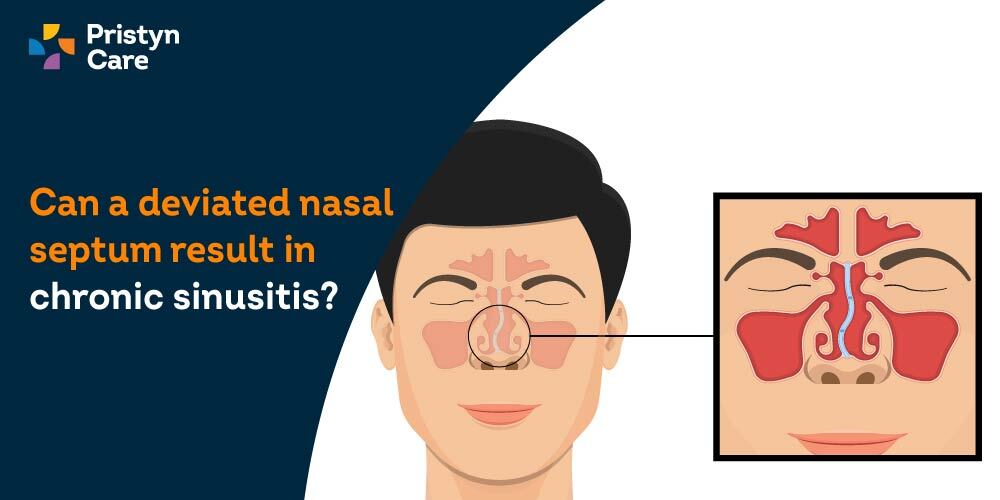![]() Views: 3,643
Views: 3,643
Can a deviated nasal septum result in chronic sinusitis?
Over time, if the septal deviation is not treated, the infections continue to recur and can lead to chronic/recurring sinusitis. .
Dedicated Support at Every Step!
Our Doctors are available 24 hours a day, 7 days a week to help you!
This is why, often, when patients seek treatment for chronic sinusitis through FESS (Functional Endoscopic Sinus Surgery), their ENT doctors check for nasal septum deviation and suggest combined FESS-Septoplasty treatment to them.
Table of Contents
What happens when a patient has deviated nasal septum?
Nasal septum deviation is often a naturally occurring phenomenon and is not painful at all. It can also occur if the patient has had severe nasal trauma. Since it usually occurs naturally, most patients aren’t even aware they have it and only realize its presence after careful examination.
However, though DNS doesn’t cause any pain or discomfort on its own, it’s associated with several symptoms like snoring, obstructive sleep apnea, breathing difficulties, and infections in the sinus, tonsils, etc. Most patients visit their ENT doctors for these associated issues when they get diagnosed with a deviated nasal septum.

No Cost EMI, Hassle-free Insurance Approval
Why does a deviated septum result in chronic sinusitis?
As discussed above, a deviated septum is the perfect breeding ground for infectious bacteria. Since the nasal canal and sinuses are so closely related, infection within one part can easily spread to the other. Moreover, since deviated septum makes breathing difficult and leads to inflammatory changes in the nasal canal and sinus tissues. Therefore, nasal septum deviation is closely related to chronic sinusitis.
What happens during a FESS-Septoplasty combined surgery?
During the combined surgery, the surgeon will anesthetize you with partial or complete anesthesia based on your preference and health condition. Once anesthetized, you will be moved to the operation theatre. The surgeon will begin removing the excess tissue from the septum on its convex side and use this tissue to pad the concave side of the nasal septum to reconstruct its size. Any excess tissue will be removed and discarded. Then, they will use an endoscope to breach the sinus and drain and wash it to clear all the discharge and prevent future infections. Finally, the endoscope will be taken out, the patient’s nose will be padded with absorbent packing material, and the dressing will be completed.
How can a patient with a deviated nasal septum prevent chronic sinusitis infection/recurrence?
If you have a deviated nasal septum or other risk factors of chronic sinusitis like nasal polyps, asthma, smoking habit, etc., you should follow the given preventive tips to avert sinus infections:
- Get treatment for upper respiratory infections, like common colds, as soon as possible.
- Avoid contact with people suffering from infectious diseases, like colds, etc. Wear a mask in their presence.
- Maintain proper hygiene. Wash your hands before all your meals.
- If you frequently suffer from allergies, then avoid your allergens and manage your allergies through proper medications.
- Tobacco and cigarette smoke can worsen your condition and lead to irritation and inflammation of the nasal and lung passages, so avoid those as much as possible.
- If you live in dry areas or areas with heavily polluted air, you should use a humidifier to improve your breathing. Also, make sure your humidifier is clean and free of dirt, mold, etc.
If you still get a sinus infection despite following these, connect with an ENT specialist immediately for proper treatment for the same.
FAQs around Deviated Nasal Septum
Septoplasty surgery straightens the nasal septum, making the airflow through the nose easier. This helps the patient breathe better and improves their inflow of oxygen. Their improved breathing helps them recover from infections faster and stops the recurrence of such infections.
No, as stated above, only patients whose sinus infections are worsened by their deviated nasal septums require septoplasty surgery.
Yes, since both FESS and septoplasty surgery are performed through the nose, they are performed by an ENT specialist.
No, the overall recovery from the combined procedure is not more painful or longer than just endoscopic sinus surgery.








